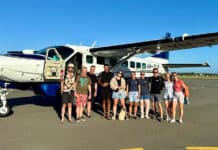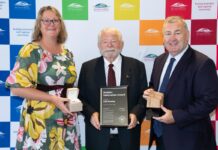
A once manual and risky inspection of Council’s water towers will next week be carried out by a drone as part of an investigation into the possibilities around automation.
The survey by the drone – or Unmanned Aerial Vehicle (UAV) – will assess the condition of the towers themselves and the condition of telecommunications transmission equipment on top of them.
Bundaberg Regional Council technical support officer Tim Stenner said the drone survey would provide efficiencies and improve safety for staff.
“It can be very difficult to access some of this equipment and see what condition it is in and what the condition of the structure is around them,” Tim said.
“The use of UAV allows for these inspections to be carried out remotely.
“Our goal is to automate as much of the maintenance inspection workload as possible through the use of machine learning and artificial intelligence platforms and to make the inspection process faster, cheaper and safer for our staff.”
Mr Stenner said Council needed to be aware of the physical condition of the concrete, steel hand rails and any other component of the water tower structures.
“As you can appreciate these structures are ageing and through these visual inspections we will create strategies to manage their condition into the future,” he said.
“Once we’ve taken images of the towers we will have a baseline so we can report on any changes detected during future inspections.
“This would include even down to a loose bolt on a clamp, a broken wire, a bird’s nest in the tower and so on.”
There are 10 water towers throughout the region that will be included in the drone survey, including the historic East Water Tower.
Tim said test footage on the East Water Tower proved the advantages of using drone technology, showing the top of the water reservoir that was damaged during a storm last year.
“No staff had to climb to the top, harness and access the top of the tower with all of the inherent risks that are involved in those activities in an area with limited safe access,” Tim said.
“The time it takes to complete the safe access permissions and requirements can be lengthy, but in under three minutes the drone has provided footage that gives us a clear understanding of what the condition of the structure is.
“The efficiency this gains in staff safety, time and productivity are substantial and clearly evident.”
Council is investigating increased use of remote technology and Tim said he believes there are many possibilities for its use within local government.
“We’re already looking in to volumetric measurement from aerial surveys, which helps us to keep up-to-date measurements of stockpiles,” he said.
“Other opportunities include road maintenance issue detection, weed detection and algae monitoring or even automated data feeds for water levels.
“Taking advantage of this sophisticated equipment can help to ensure efficiencies within Council but could also open up opportunities for more frequent monitoring which would mean we are working with the most accurate and current information possible.”
The drone survey of water towers will commence next week.







